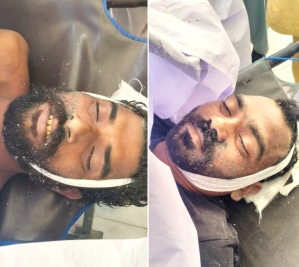
Rukhsana Asif, a Christian mother of two children in Faisalabad, Pakistan, was devastated when she learned that her husband and his cousin had died from poisonous gas while cleaning a clogged sewer manhole.
Her husband, Asif Masih, was off work on March 17 when he received a call to clean a blocked sewer outside the Sapphire Marquee wedding hall.
“He told me he’ll be back in a few hours after completing the job, but instead news came that he and his cousin Shan had died in the manhole,” Rukhsana said.
Shan Masih is survived by his wife and three children; the children are all under the age of 7.
Working at the Faisalabad Water and Sanitation Agency (FWMC) and the Faisalabad Waste Management Company (WASA), the two men were the latest of more than 50 predominantly Christian sewer employees who have died due to lack of proper safety equipment, rights advocates said.
Attorney Akmal Bhatti, chairman of the Minorities Alliance Pakistan, said the marquee’s management forced the two workers to enter the sewer without adequate equipment, including hygiene kit and gas masks.
“The toxic gases in the manhole proved lethal for the two, killing them instantly,” Bhatti said, pointing to the precarious conditions in which sewer workers, mostly Christians, are forced to work, often resulting in their deaths.
“Over 50 Christian sanitation workers have perished in Faisalabad alone due to the absence of adequate safety gear,” Bhatti told Christian Daily International-Morning Star News. “These workers represent one of the most marginalized segments of Pakistani society, but despite the occurrence of so many deaths, the government is yet to do something about it.”
Bhatti said that the marquee management and neither of the two government departments where the two men worked were willing to take responsibility for the two deaths.
“WASA and FWMC say the two men have not died while performing official duties, while the marquee management claims that it was the government departments’ responsibility to provide their staff with safety equipment,” he said.
The bodies of the two Christians floating in the sewage were discovered by a rickshaw driver who had dropped them off at the site earlier.
“The rickshaw driver says he raised alarm when he saw the bodies,” Bhatti said. “However, instead of helping him, the staff of the marquee fled from the scene. Meanwhile, a crowd gathered at the scene, and someone called the rescue services who came and retrieved the bodies from the manhole despite the challenging conditions.”
Bhatti said his team would make every effort to help the bereaved families to obtain compensation from the government and the marquee management. He pointed out that Christian sewer workers face such dangers on a daily basis.
Tahir Khalil Sindhu, a Christian minister for human rights in the newly-formed Punjab provincial cabinet, visited the grieving families and assured them of the government’s support.
“It’s a very tragic incident, and our hearts go out to the families of the two deceased workers,” Sindhu told Christian Daily International-Morning Star News. “The Punjab government will take care of the families and will also cover the educational expenses of their children.”
Rights activists, however, say that despite repeated assurances by the government, working conditions of sewer workers have shown no improvement. Naveed Walter, president of Faisalabad-based advocacy group Human Rights Focus Pakistan, said he filed a petition in the Lahore High Court in 2015 for safer conditions.
“Though the court ordered the administration to provide sewer workers with the necessary hygiene and safety kits, nothing has been done to date,” Walter said. “Over the years, many have died, many have become disabled, others have faced various health-related complications.”
Such hazards have brought great hardship on families of workers, who are forced to work without health insurance or social security.
“It’s time the government and local authorities take immediate action to prevent other human tragedies of this nature,” Walter said.
Asif Masih’s widow said he had taken the job to meet the financial challenges of the family on his meager salary in a time of unprecedented inflation.
“I don’t know how I will raise my children without him,” she said.
Pakistan ranked seventh on Open Doors’ 2024 World Watch List of the most difficult places to be a Christian, as it was the previous year.




